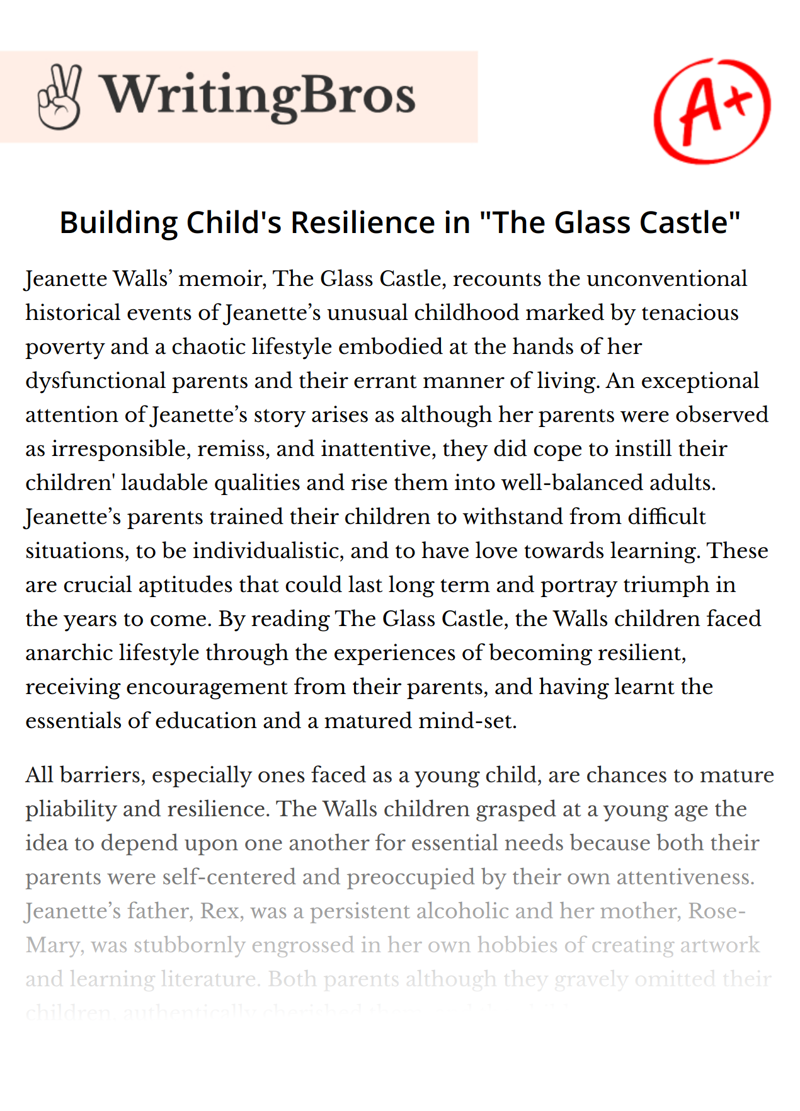Building Child's Resilience in "The Glass Castle"

Jeanette Walls’ memoir, The Glass Castle, recounts the unconventional historical events of Jeanette’s unusual childhood marked by tenacious poverty and a chaotic lifestyle embodied at the hands of her dysfunctional parents and their errant manner of living. An exceptional attention of Jeanette’s story arises as although her parents were observed as irresponsible, remiss, and inattentive, they did cope to instill their children' laudable qualities and rise them into well-balanced adults. Jeanette’s parents trained their children to withstand from difficult situations, to be individualistic, and to have love towards learning. These are crucial aptitudes that could last long term and portray triumph in the years to come. By reading The Glass Castle, the Walls children faced anarchic lifestyle through the experiences of becoming resilient, receiving encouragement from their parents, and having learnt the essentials of education and a matured mind-set.
All barriers, especially ones faced as a young child, are chances to mature pliability and resilience. The Walls children grasped at a young age the idea to depend upon one another for essential needs because both their parents were self-centered and preoccupied by their own attentiveness. Jeanette’s father, Rex, was a persistent alcoholic and her mother, Rose-Mary, was stubbornly engrossed in her own hobbies of creating artwork and learning literature. Both parents although they gravely omitted their children, authentically cherished them, and the children were content despite their day to day obstacles overcoming poverty, despair and adversities. The Walls’ children adjusted to their domain and situations of having dysfunctional parents by upending roles with them. The children cooperated with each other to help their parents undertake outside the home. This turnaround of roles is evident when the children compulsed their mother to start up a teaching position. Since the principal threatened to fire her with her untrustworthy actions, the children took the responsibility to make sure their mother can continue to work. The mother mentioned “You have a job. You can earn money. Lori can earn money, too. I’ve got more important things to do” (Walls 218), which encouraged the children to take responsibility. The children took the capacity to perform occupational activities such as waking, feeding, clothing, and organizing rides for their mother. They also took on duty to clean her classroom, mark necessary assignments, cleaning her classroom, marking her assignments and produce lesson plans for her students. In an ironic matter, with her unskillful actions, Rose-Mary furnishes her children with the fundamental experience of what follows to be an practable adult.
The parents´ continuous neutral attitude and encouragement towards the children’s simplistic needs for safety and age applicable intentions is clearly imaged in the stories of Jeanette’s early childhood. When Jeanette was three years old, age three, she was painfully burnt while making hotdogs, and as she was asked by the nurse of her intentions to make a hotdog. It was later seen that Jeanetteś mom trusts her enough for those actions as '[My children] were all post mature. That's why they're so smart. Their brains had longer to develop' (42). Evidently, being only three years old, Jeanette was aware that she needed to be self-sufficient and learned the things she needed in order to eat whenever necessary. As the Walls Children grew up, they learned to flourish off their despair, and instead, became strong and determined. At when Jeanette was young, she withheld resilience from her motehr telling her 'You've got to get right back in the saddle. You can't live in fear of something as basic as fire' (Walls 15). This quotation further emphasizes how Rex’s and Rose Mary’s careless motion towards parenting heedfully educated their children to uphold themselves because they didn’t have another option but to survive and fulfil their lives.
Lastly, neglecting the fact that Rex and Rose aren’t able to be reliable enough to hold down a job and bear on their own academic acknowledgements, they coped to teach their children the essentials of having an education and instill a matured mind-set. The Walls family was able to be unified as a whole by sharing the characteristics of enjoying learning and is the source to children’s lovable memories. They would read together and connect through the importance of education. Jeanette remembers her indelible moments as her mother would always say, “We may not have insulation...but we have each other' (Walls 177). The Walls not only believed in an expanded and matured mindset; sharing knowledge was in fact how Rex and Rose Mary best communicated their love and affection towards their children. When Rex was clear headed, he taught his children the knowledge of geometry and rigorous science courses. Rose, a teacher herself, shared to her children the value of English. At about 9 years old, Jeanette and her siblings were honored for their affection towards literature and were all put in a gifted reading class. Because this interpretation of love from the parents was mere, they succeeded, to inculcate in their children the initiatives to become triumphal and live a fulfilled life.
In conclusion, Jeanette’s parents may have had a ton of blemishes and weaknesses, but when it was brought to how Wall’s children came along, they learned to be self-sufficient, tough, determined, and educated. As a reminder, the main theme follows throughout the memoir the Walls children facing an anarchic lifestyle through the experiences of becoming resilient, recieving support from their parents, and learning the importance education and a matured mind-set. It was their parent’s sincere compassion combined with ridiculous neglect, which empowered the Walls children with the implements to overcome the hurdle of their raised. It is because they were aware of affection towards them, that the Walls children, together, modified their faltered blocks, created by their parent’s dysfunctionality into means, and allowed the children to venture and become victorious.
Cite this Essay
To export a reference to this article please select a referencing style below

